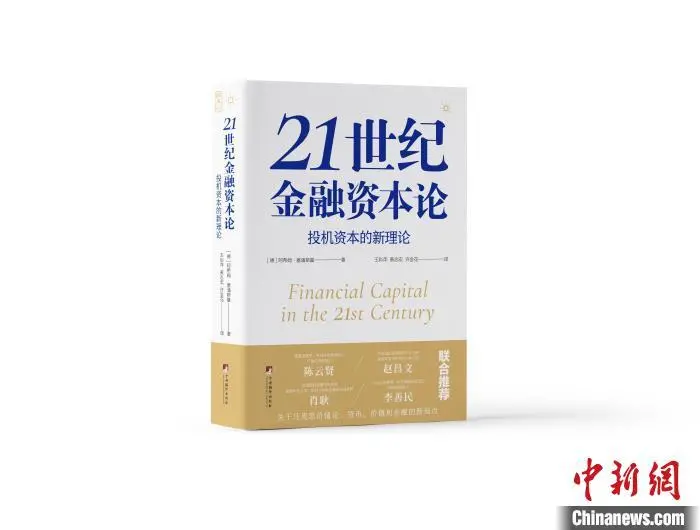Liu Zhiqin, Senior Researcher, Chongyang Institute for Financial Studies, Renmin University of China
His talk on the launch of the book.
We are currently in an era of great change, the likes of which we will not see again in the next hundred years. The economic structure, trade structures and financial capital are in a state of upheaval and change. Great changes will bring great reforms, especially in the field of theory, and many masters and “great men” will emerge to renew the traditional theories and put forward concepts that meet the needs of modern development. In the new era, new economic phenomena are constantly emerging, and it is normal that “theories come from many disciplines”. As a result, there are many debates, controversies and new arguments, and these ideas are tested in practice.
The book “Financial Capitalism in the 21st Century: A New Theory of Speculative Capital”, published by Central Translation and Interpretation Press, is an important work. With a critical eye and a unique way of thinking, the author, Achim Szepanski, has presented the most objective and accurate analytical study of the emergence and development of financial capital in the 21st century.
In order to understand the core idea of this work, it is necessary to have a basic understanding of the author of the book. Achim Szepanski is a German academic who works in the field of financial theory. More importantly, he is described as a “scholar of the left” who “draws from a broad critical tradition that points to a rapidly evolving future”. This makes the otherwise “obscure” theory of finance capital accessible and entertaining in his descriptions.
The fourth chapter of the book deals with ideas on “fictitious capital”. The author says: “For Marx, fictitious capital is the most developed form of capital, the most important form of existence of capital.” Nowadays, there is much discussion in the financial sector about the existence and performance of “fictitious capital” and the economic and social effects it entails.
The author of this book emphasizes: “Stocks, bonds and other securities were also called fictitious capital by Marx.” The breeding ground for “fictitious capital” is the background of profits made through “interest, interest-bearing capital and credit”, which contributes to the flourishing of “fictitious capital”. Obviously, these arguments are very useful for today’s Chinese finance capital.
Chapter 6, “Investment Capital”, is very interesting because it is devoted in detail to “derivatives”. We are both familiar and unfamiliar with this type of product, loving and hating it at the same time. Because “derivatives have no tradition to follow, they are a unique invention”. In modern finance and economics, “derivatives” are ubiquitous but nowhere to be found. Some generate huge profits, while others gobble up millions of dollars. Therefore, how one views and deals with “derivatives” in relation to the status and role of financial capital is extremely important. In general, “derivatives” should be kept in their “cages” and should not be allowed to run rampant in the market and cause trouble everywhere. The author mentions that “‘derivatives’ are a special kind of ‘speculative capital'” and that “investment capital achieves its ultimate goal through derivatives.” …, because “derivatives are a source of profit ……”, so ” derivatives are not only different from traditional commodities, but also different from other forms of capital”.
Currently, China’s financial capital market is confronted with a variety of “derivatives” and their effects. It is a pity that the criticism often does not go beyond a pauscla rejection of derivatives, instead of developing a deep understanding of the internal logic and development trends – often abusing the value of “derivatives”.
“Speculative capital” has three main business lines: Arbitrage, hedging and speculation. All three are inextricably linked to the commodity “derivatives”. Therefore, the study of “derivative business” in the new era of financial capital is a topic that must be taken seriously by financial professionals. The value and function of this work lies in the practical significance it has for our financial capital market today. As mentioned earlier, we need to seriously examine and analyze the reality and problems of “fictitious capital” in the stock, securities and bond markets. However, we should be aware that the author focuses on analyzing the phenomenon of financial capital in capitalist countries, which is very different from China’s socialist market economy, and that some of his arguments are not fully applicable to the reform of China’s financial capital market.
The discussion in this book triggered two thoughts in my mind:
First, whether “capital” has a “class nature”, and how to judge the intervention of “capital” in national and international politics. In today’s geopolitical conflicts, “capital” has become a “weapon” that can be used. This is a very important question.
Secondly, how can the status quo of China’s stock and securities markets be improved? More than 10 years ago, we said that “China’s stock market is the most bizarre economic phenomenon in the world economy”. More than 10 years later, this view is still true. Securities are “fictitious capital”, how should we look at the Chinese “fictitious capital” market, and what are the reasons and necessities for its continued existence?
I would also like to put forward some suggestions:
First, communication between Chinese and foreign finance scholars should be strengthened so that the international academic community can learn more about the research priorities and directions of Chinese scholars, so as to conduct in-depth academic exchanges and promote the integration of Chinese and foreign finance capital markets;
Second, the translation community should translate more works and views of Chinese scholars and introduce them to their international counterparts to enhance mutual understanding;
Third, regular discussions, forums and seminars should be organized between authors, translators and readers to gain the support and participation of like-minded people.

